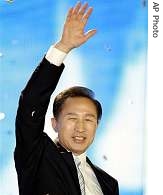-
(单词翻译:双击或拖选)
Seoul
20 August 2007
South Korea's main conservative party has selected a former Seoul mayor as its candidate for president. Elections to replace current South Korean President Roh Moo-hyun take place in four months. As VOA's Kurt Achin reports from Seoul, the conservatives enjoy a strong lead in polls.

Lee Myung-bak, waves his hand after he was elected presidential candidate in Seoul, 20 Aug 2007
An official from the Grand National Party, or GNP, confirmed Monday what many have expected for months.
He announces that former Seoul Mayor Lee Myung-bak is the party's candidate for the South Korean presidency1.
As a former senior executive in South Korea's Hyundai conglomerate2, Lee is viewed as a pro-business leader with a knack3 for seeing projects through.
He is most readily associated with an environmental project - the Cheonggyecheon stream which runs through Seoul. As mayor, Lee overcame ridicule4 and bureaucratic5 hurdles6 to renew the stream, which Japanese colonial rulers covered with concrete in the early 20th century.
As supporters chanted his name at Monday's GNP convention, Lee promised an action agenda.
Lee vows7 to turn South Korea's economy around and unite its society.
Lee defeated his main rival, former GNP chairwoman Park Geun Hye, by a narrower margin8 than some expected, about 1.5 percent. Park, the daughter of the late dictator Park Chung-hee, would have been the country's first female presidential candidate.
Experts say unless there is a major shift in South Korean politics, Lee is likely to be the next president. The Uri party of President Roh Moo-hyun, whose term expires in five months, formally dissolved itself a few days ago. The party has suffered mass defections by lawmakers hoping to distance themselves from Mr. Roh, whom many voters thing has mismanaged the economy.
South Korean conservatives also say President Roh has been too generous in making concessions9 to North Korea. Although Seoul has given billions of dollars in aid and investment to the North, Pyongyang tested its first nuclear weapon last year. GNP candidates want the North to reciprocate10 more in their dealings.
The GNP has been sharply critical of Mr. Roh's announcement this month of a summit with North Korean leader Kim Jong Il.
GNP spokeswoman Na Kyung-won tells reporters the summit seems like a political move designed to confuse voters just months before the election.
The summit was originally planned for later this month. However, it has been postponed11 until October, just two months before the presidential vote, due to flooding in North Korea.
 收听单词发音
收听单词发音
1
presidency

|
|
| n.总统(校长,总经理)的职位(任期) | |
参考例句: |
|
|
|
2
conglomerate

|
|
| n.综合商社,多元化集团公司 | |
参考例句: |
|
|
|
3
knack

|
|
| n.诀窍,做事情的灵巧的,便利的方法 | |
参考例句: |
|
|
|
4
ridicule

|
|
| v.讥讽,挖苦;n.嘲弄 | |
参考例句: |
|
|
|
5
bureaucratic

|
|
| adj.官僚的,繁文缛节的 | |
参考例句: |
|
|
|
6
hurdles

|
|
| n.障碍( hurdle的名词复数 );跳栏;(供人或马跳跃的)栏架;跨栏赛 | |
参考例句: |
|
|
|
7
vows

|
|
| 誓言( vow的名词复数 ); 郑重宣布,许愿 | |
参考例句: |
|
|
|
8
margin

|
|
| n.页边空白;差额;余地,余裕;边,边缘 | |
参考例句: |
|
|
|
9
concessions

|
|
| n.(尤指由政府或雇主给予的)特许权( concession的名词复数 );承认;减价;(在某地的)特许经营权 | |
参考例句: |
|
|
|
10
reciprocate

|
|
| v.往复运动;互换;回报,酬答 | |
参考例句: |
|
|
|
11
postponed

|
|
| vt.& vi.延期,缓办,(使)延迟vt.把…放在次要地位;[语]把…放在后面(或句尾)vi.(疟疾等)延缓发作(或复发) | |
参考例句: |
|
|
|















